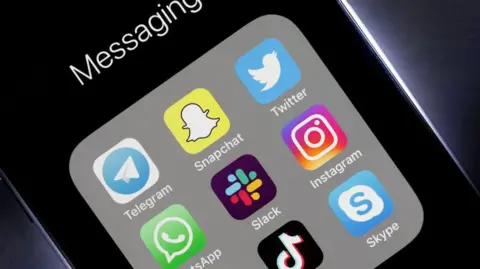 Getty Photographs
Getty PhotographsPrior to now 24 hours I’ve written greater than 100 WhatsApp messages.
None of them had been very thrilling. I made plans with my household, mentioned work initiatives with colleagues, and exchanged information and gossip with some associates.
Maybe I have to up my sport, however even my most boring messages had been encrypted by default, and used WhatsApp’s highly effective laptop servers, housed in numerous knowledge centres around the globe.
It’s not an affordable operation, and but neither I nor any of the folks I used to be chatting with yesterday, have ever parted with any money to make use of it. The platform has practically three billion customers worldwide.
So how does WhatsApp – or zapzap, because it’s nicknamed in Brazil – make its cash?
Admittedly, it helps that WhatsApp has an enormous mother or father firm behind it – Meta, which owns Fb and Instagram as effectively.
Particular person, private WhatsApp accounts like mine are free as a result of Whatsapp makes cash from company prospects wanting to speak with customers like me.
Since final 12 months corporations have been in a position to arrange channels at no cost on Whatsapp, to allow them to ship out messages to be learn by all who select to subscribe.
However what they pay a premium for is entry to interactions with particular person prospects by way of the app, each conversational and transactional.
The UK is relatively in its infancy right here, however within the Indian metropolis of Bangalore for instance, now you can purchase a bus ticket, and select your seat, all by way of Whatsapp.
“Our imaginative and prescient, if we get all of this proper, is a enterprise and a buyer ought to be capable to get issues achieved proper in a chat thread,” says Nikila Srinivasan, vp of enterprise messaging at Meta.
“Which means, if you wish to ebook a ticket, if you wish to provoke a return, if you wish to make a cost, you must be capable to do this with out ever leaving your chat thread. After which simply go proper again to all the different conversations in your life.”
Companies may now select to pay for a hyperlink that launches a brand new WhatsApp chat straight from an internet advert on Fb or Instagram to a private account. Ms Srinivasan tells me that is alone is now price “a number of billions of {dollars}” to the tech large.
 Meta
MetaDifferent messaging apps have gone down completely different routes.
Sign, a platform famend for its message safety protocols which have develop into industry-standard, is a non-profit organisation. It says it has by no means taken cash from traders (not like the Telegram app, which depends on them).
As an alternative, it runs on donations – which embody a $50m (£38m) injection of money from Brian Acton, one of many co-founders of WhatsApp, in 2018.
“Our objective is to maneuver as shut as potential to turning into totally supported by small donors, counting on a lot of modest contributions from individuals who care about Sign,” wrote its president Meredith Whittaker in a weblog submit final 12 months.
Discord, a messaging app largely utilized by younger players, has a freemium mannequin – it’s free to sign-up, however extra options, together with entry to video games, include a pricetag. It additionally presents a paid membership known as Nitro, with advantages together with high-quality video streaming and customized emojis, for a $9.99 month-to-month subscription.
Snap, the agency behind Snapchat, combines a variety of these fashions. It carries advertisements, has 11 million paying subscribers (as of August 2024) and likewise sells augmented actuality glasses known as Snapchat Spectacles.
And it has one other trick up its sleeve – in accordance with the web site Forbes, between 2016-2023 the agency made practically $300m from curiosity alone. However Snap’s fundamental income is from promoting, which brings in additional than $4bn a 12 months.
 Getty
GettyThe UK-based agency Aspect expenses governments and huge organisations to make use of its safe messaging system. Its prospects use its tech however run it themselves, on their very own personal servers. The ten-year outdated agency is in “double digit million income” and “near profitability”, its co-founder Matthew Hodgson tells me.
He believes the preferred enterprise mannequin for messaging apps stays that perennial digital favorite – promoting.
“Mainly [many messaging platforms] promote adverts by monitoring what folks do, who they discuss to, after which concentrating on them with the very best adverts,” he says.
The thought is that even when there’s encryption and anonymity in place, the apps don’t have to see the precise content material of the messages being shared to work out lots about their customers, they usually can then use that knowledge to promote advertisements.
“It is the outdated story – for those who the person, aren’t paying, then the probabilities are that you’re the product,” provides Mr Hodgson.




